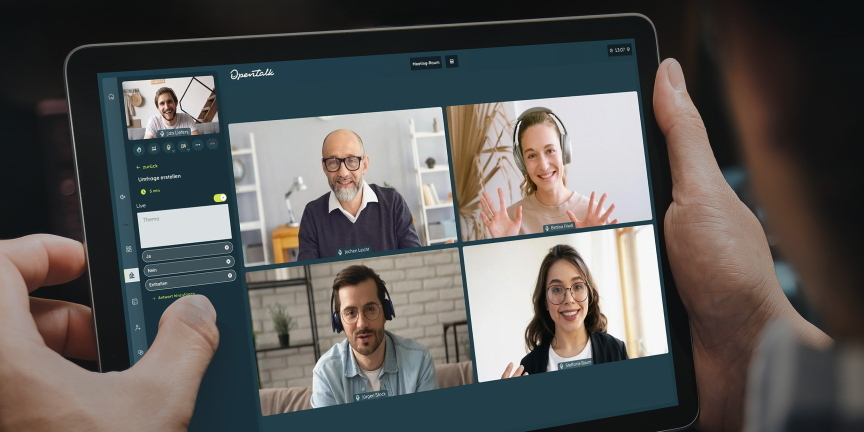Thuringian state administration goes for OpenTalk

We are pleased to announce that OpenTalk is now providing the video conferencing solution for the administration and municipalities of the Free State of Thuringia. The first local authorities have already signed agreements with the Free State. OpenTalk is used in particular for digital committee work in all departments. The project was coordinated by the Thuringian Ministry of Finance.
"When we evaluated the open source video conferencing systems available at the time at the beginning of the coronavirus pandemic, we came to the conclusion that the existing solutions did not meet the high requirements of public administration in terms of technology or functionality. We work with sensitive data that must be protected at all costs. With OpenTalk, we have a strong partner at our side who has developed a modern, secure and scalable video conferencing solution that can meet the special needs of the administration," says Dr. Hartmut Schubert, CIO of the Free State of Thuringia.
In addition to meeting data protection and security requirements, a key aspect was the integration into the existing infrastructure and operating processes of the state data center. Among other things, the video conferencing solution is integrated into the existing login procedure so that access to the application can be controlled on a user-specific basis. It will also be possible to participate in video conferences by telephone and, in future, via a conference system.
"After several years of development work, local and state authorities can now use OpenTalk, a sophisticated open source video conferencing solution, across the board. By involving key state authorities such as the Thuringian Ministry of the Interior, the Thuringian Court of Audit and the Thuringian State Commissioner for Data Protection and Freedom of Information at an early stage, it has been possible to incorporate the special requirements of the administration into the project," says Christian Stötzer, Head of Division at the Thuringian Ministry of Finance.
Markus Michels, Managing Director of OpenTalk: "Under the motto 'Public Money - Public Code', we have committed ourselves to ensuring that all results from this project are freely accessible and can be used by other administrations. Together with the Thuringian Ministry of Finance, we were able to create a convincing solution that can now also be adapted by other administrations." To this end, the program code was published under the European Public License (EUPL 1.2) on OpenCoDE.de and open standards and interfaces were used wherever possible.
The German Federal Office for Information Security (BSI) is currently evaluating OpenTalk under the test number BSI-DSZ-CC-1236 in accordance with CC-EAL4, the highest possible level of confidence in a security service. Once the test procedure has been completed, OpenTalk will be the first open source video conferencing software to achieve such a high level of certification.
Further functions such as sub-room audio, a whisper button and the option of panel discussions are planned for the future. In addition to GDPR-compliant recording, it will then also be possible for a large number of citizens to participate in public meetings via streaming platforms. AI-based functions will also provide useful support for day-to-day work.
With the launch of the project, OpenTalk is setting new standards in the implementation of digitally sovereign video conferencing solutions that meet both GDPR requirements and specific use cases such as audit-proof voting or securely managed meeting minutes. Other federal states and administrations are already piloting OpenTalk and have expressed concrete interest.
More articles
Secure video conferencing with OpenTalk: Technical measures for administrators
OpenTalk, the European video conferencing solution, offers administrators a customisable, scalable and secure platform that is specifically tailored to the needs of public authorities and businesses.
New CEO at OpenTalk: Strategic course set for digital sovereignty
With the appointment of Agathe Hütter as CEO, OpenTalk is sending a clear signal for the next phase of development of the open source video conferencing solution.